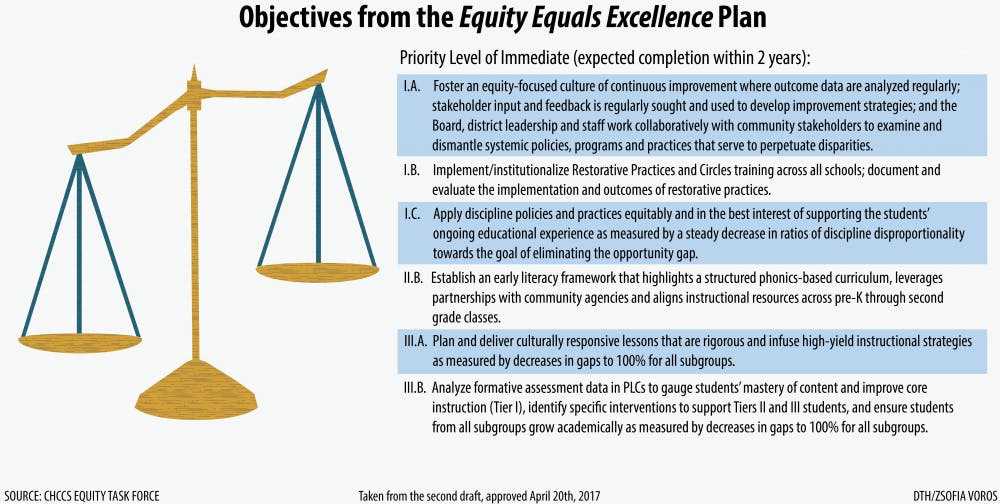The Equity Equals Excellence plan outlines objectives and action steps that address culture, curriculum and instruction within the district. The plan lists immediate priorities that include: implementing Restorative Practices and Circles trainings; analyzing discipline data; and developing diverse teams to review curriculums and provide trainings on culturally responsive teaching practices.
Jeff Nash, director of community relations for CHCCS, said ultimately, the goal is for strategies put into place through the equity plan to trickle down — affecting everything that is done in the school environment.
“Our superintendent has made the statement many times that equity is not a thing, it’s not something you check off a box and say ‘ok, now we’re going to do equity’ — it truly permeates into everything we do,” Nash said. “If we want to change the equity culture in our district, then it impacts everyone: it impacts board members, custodians, bus drivers.”
Equity 101 classes are now a required program for teachers and support staff, according to the plan.
“We want this Equity 101 training to not just be in professional development sessions for teachers but to carry over into lesson planning or testing or whatever it is teachers are learning,” Nash said.
Certain honors classes are transitioning into hybrid classes, Nash said. These will offer honors and non-honors credit in the same classroom environment.
At East Chapel Hill High, world history classes are offered with a hybrid curriculum — a step Murray said might help address the racial divides she's observed, too.
“The district is trying, and I think that’s the most important thing,” Murray said.
She said the motivation for equity changes might include a number of factors, like observations of classrooms or reputation of the school district.
A local cry for action
The issue of racial inequity within the schools is a problem that began the day schools were first integrated, Hunter said.
“What we’re trying to do is to change the narrative around the achievement gap and change the narrative around all of the disproportionality of all the proportions in our system,” Hunter said. “Schools are not unlike any other system — not unlike public health, criminal justice — and racial gaps and disproportionalities are everywhere.”
To get the day's news and headlines in your inbox each morning, sign up for our email newsletters.
On Sept. 16, the Campaign for Racial Equity in Our Schools will hold an assembly to address the community’s equity concerns and start finding ways to mobilize for action.
Mandy Hitchcock, one of the event organizers and a CHCCS parent, said cooperation from the current school board and CHCCS Superintendent Pamela Baldwin is allowing discussions on equity to remain a priority. But the biggest hurdle to equity, Hitchcock said, might come from white parents in the district.
“The parents that don’t have to deal with these issues don’t want to deal with these issues — they have a difficult time seeing equity as anything other than taking something away from their own children,” she said. “In a system with a closed budget — it could very well mean to achieve equity we’re going to have to take some pie from this plate and move it to another plate. And that is when parents say no, you can have someone else’s pie but don’t take mine.”
Recent political rhetoric makes the need for racial equity more important now than ever before, Hunter said.
“It’s not just an achievement gap, it’s a gap in every single thing that you look at,” she said. “There is no element of school life where race isn’t determining some aspect of education. Changing the narrative goes much deeper than what’s located in families of color, it’s located deep in a system that we’ve named racism.”
city@dailytarheel.com




